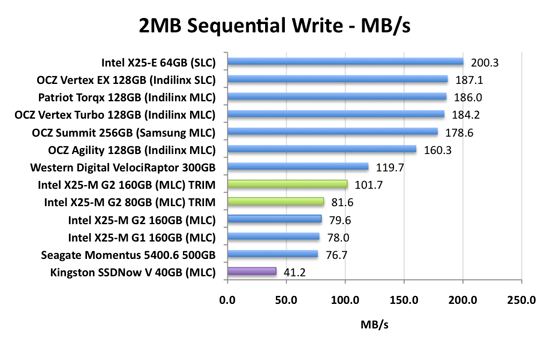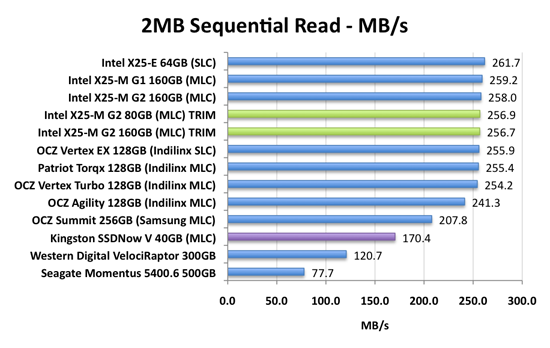The SSD Improv: Intel & Indilinx get TRIM, Kingston Brings Intel Down to $115
by Anand Lal Shimpi on November 17, 2009 7:00 PM EST- Posted in
- Storage
The Test
| CPU | Intel Core i7 965 running at 3.2GHz (Turbo & EIST Disabled) |
| Motherboard: | Intel DX58SO (Intel X58) |
| Chipset: | Intel X58 |
| Chipset Drivers: | Intel 9.1.1.1015 + Intel IMSM 8.9 |
| Memory: | Qimonda DDR3-1066 4 x 1GB (7-7-7-20) |
| Video Card: | eVGA GeForce GTX 285 |
| Video Drivers: | NVIDIA ForceWare 190.38 64-bit |
| Desktop Resolution: | 1920 x 1200 |
| OS: | Windows 7 x64 |
Sequential Read/Write Speed
Using the latest build of Iometer I ran a 3 minute long 2MB sequential write test over the entire span of the drive. The results reported are in average MB/s over the entire test length:

I ruined the surprise earlier, but the X25-M G2 160GB can now write at speeds of up to 100MB/s. The 80GB version doesn't get the benefit. The rest of the SSDs are approaching 2x that performance however. The poor Kingston drive is limited by its 5-channel implementation and barely manages more than 40MB/s. This will keep the Kingston SSDNow V series from cannibalizing X25-M sales, while at the same time offering a taste of what good SSDs have to offer at lower price points.

We're nearly tapped out on sequential read speed. The new TRIM firmware appears to drop performance a bit but not much. SATA 6Gbps will be necessary before we can see higher sequential read speeds from a single SSD.
True to Kingston's claims, the SSDNow V 40GB pulls around 170MB/s thanks to its narrower configuration. Not within arm's reach of the more expensive SSDs but still much faster than a mechanical drive.










162 Comments
View All Comments
Voo - Tuesday, October 27, 2009 - link
Ok I was a bit surprised and tried it myself with my 160gb Intel G2 (no firmware update yet)Copy 10gb file onto drive, MSE full scan and extracting a 4gb file with 7z while the usual stuff (FF, PS, eclipse and winamp) running in the backgorund and I got a maximum QD of under 8, which is higher than I expected it to be, but still far away from a QD of 16.
And when doing more multitasking stuff I'd probably tax the rest of the system more than the SSD so at least for my usual behavior a QD >8 is unrealistic, but I see your point.
There are probably some people who could get a QD of 10-12 in a normal workload, so that could be interesting for them :)
GullLars - Wednesday, October 28, 2009 - link
There is a big difference between average queue and queue during operations. The IO queues are relatively low for all the background operation the OS does, and sequensial read/write, but when you do things like open administrative tools, open a program, or install something, you will se queue spikes of easily 50-60.After i commented this article i had a discussion with some other benchmarkers, and we found that normal use generates IO queue spikes almost whenever you interact with the OS. It doesn't take much effort to generate a queue above 100. Running a couple of virus scans on folders of small files while installing a program and opening a folder with lots of pictures will get you a massive queue.
NeBlackCat - Tuesday, October 27, 2009 - link
Nice work again Anand - I just don't bother reading SSD reviews/features on other sites any more.HOWEVER...
Many people reading this will be developers wondering which controller best favours typical development activities, eg. checking out and compiling large projects. It's a hard one to guess - lots of random reading, sequential reading, random writing (temp files) and sequential writing (output files).
So how about a "typical developer" benchmark of, say, compiling the Linux kernel while concurrently encoding some H.264, grepping all the sources for a string, and watching some por..er, I mean, youtube.
Has anyone else evaluated the best SSD type for s/w development?
clarkn0va - Wednesday, October 28, 2009 - link
Not a reply to your question, but I've taken on the habit of mounting my temp files to a ramdisk. Besides the speed improvement, this should help to reduce unnecessary write cycles to the SSD. Similarly, I run without swap (or page file), RAM being as affordable as it is.lamo - Tuesday, October 27, 2009 - link
TRIM support aside, I wonder how would a pair of $85 Kingston drives in a RAID 0 striped array compare against a $225 X-25M dollar/performance-wise.cosminliteanu - Monday, October 26, 2009 - link
So - "Your best bet is to install Windows 7 with your I/O controller in AHCI mode (for Intel chipsets)" this means you set in BIOS sata controller as AHCI not as IDE ?????Or just leave as IDE and after Win7 install, update intel storage driver as normal...? which is the best solution?
LuMax - Monday, October 26, 2009 - link
Can I use Intel IMSM RAID on just the data storage drives in my PC and retain TRIM functionality on the W7 Pro OS (X-25M G2) SSD?My new PC build plan was to use a single 80GB G2 for the OS and programs and two 2TB HDDs in a RAID1 array for my data/photo/video/music storage. Although I read the relevant part of this article 3 times I am still not certain if this is doable. Yes/No?
LuMax - Tuesday, October 27, 2009 - link
I heard back from Intel today:"Thank you for contacting Intel Technical Support.
I understand your question about the Intel(R) Matrix Storage Manager and the SSD. Since the drives you will be using in RAID are non-solid state disks, and the SSD you will be using will not be part of the RAID, there should not be any problem with TRIM."
somedude1234 - Tuesday, October 27, 2009 - link
I would not expect this to be possible. It sounds like you have 3 drives hanging off of the same SATA controller. You want 2 of them in RAID 1 using the IMSM driver, and one of them using the MS driver.In my experience it would be impossible to get Windows to load 2 different drivers for different ports on the same controller.
Even if they were physically independent but identical controllers (for example if you had 2 identical SAS cards plugged into the same system), as soon as you update the driver on one controller, a reboot results in all instances of that controller using the updated driver.
DoveOfTheSouth - Monday, October 26, 2009 - link
I'd like to know this too.I'm considering a similar set-up (SSD for systems drive, RAID for data storage HDD) - seems best of both worlds.